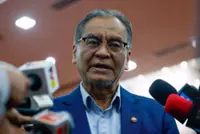PETALING JAYA: Malaysia is using a multi-pronged approach in the race to procure a vaccine for Covid-19 but it also wants to ensure it does not get into lopsided agreements while doing so, says Science, Technology and Innovation Minister Khairy Jamaluddin.
Khairy said Malaysia is still negotiating for the Covid-19 Vaccine Global Access (Covax) allocation plan co-led by the World Health Organisation (WHO) as there are some concerns.





